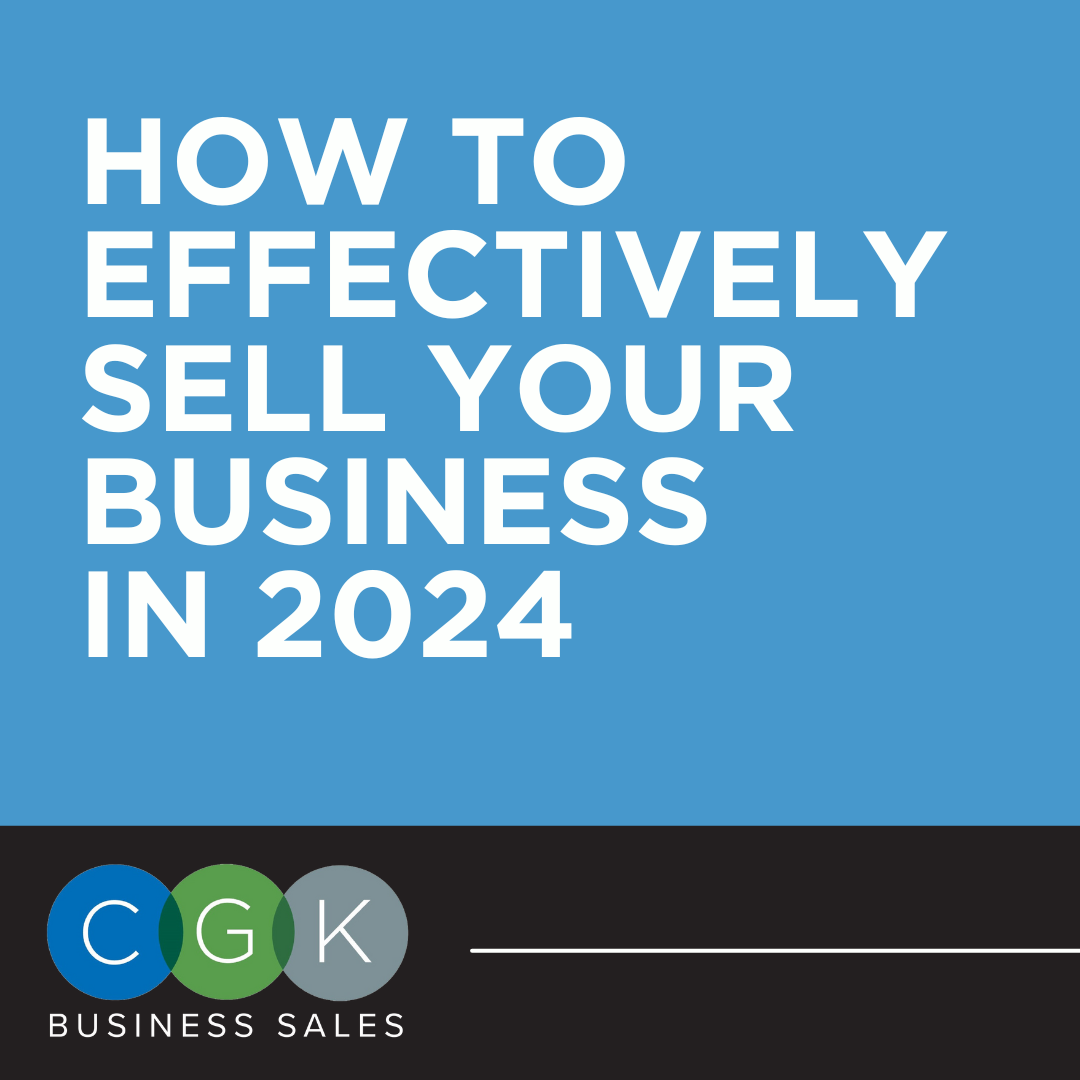Selling a business is a decision that should not be taken lightly. It comes with serious financial implications, but it’s also an emotional decision. You’ve invested years of your life into establishing and growing the company, and your life will change significantly after the sale of the business is complete.
- Make sure you take the time to consider all your options, and if you decide you want to sell your business, start planning a few years in advance so that you can get what it’s worth. The good news is, you can get started now by finding out how to sell your business without taking that final plunge. Once you’ve made your decision, you’ll have all of the knowledge and tools you need at your disposal to cut a good deal.
- This in-depth guide will offer all the information you need to start planning for the future, from how to value a small business to tips for attracting the perfect buyer. You’ll hear it all from a business broker’s insider perspective, and by the end, you’ll have the confidence you need to move forward with the sale. For now, though, let’s start from the beginning.
Why Are You Selling?
Before even thinking about how to sell your business, you should first sit down and figure out why you want to sell. Pinning down your motivations will help you develop an exit strategy. Plus, just about every prospective buyer is going to ask you why you want to sell your business, so you’ll want to have a good response.
-
- It’s Time to Retire
If you want to sell your business in preparation for retirement, that’s a best-case scenario for buyers because there’s no need to worry about competition. Of course, all sellers sign non-compete agreements when the sales go through, but buyers may still hesitate if they believe the seller will eventually return to the industry.
- It’s Time to Retire
-
- Business Owner Burnout
New business owners are almost always excited and energized by the prospect of pursuing their life goals. That excitement tends to wear out fast once people realize how hard it is to start a new business, though, and more often than not, it gets replaced by burnout. Around 40% of all business sales are motivated by seller burnout, so most buyers won’t be put off by a seller who has built a successful company and is ready to move on to something new. However, selling a business when burnout is the reason may give the new buyer some pause, as they may wonder what they are getting themselves into in your business.
- Business Owner Burnout
-
- Losing Money
If your business is losing money, you might not want to waste your time looking for buyers. No one wants to wind up spending their own money on a failing business. Unless you want to devote the time, energy, and capital into turning things around before you sell your business, you’re better off shutting it down. Selling a business that is profitable is not easy, but selling a business that is losing money is nearly impossible, unless you have $50 million or more of revenue.
- Losing Money
-
- Is It the Right Time to Sell?
Selling a business is always easier when revenues are on the way up. Even if you’ve gotten the business off the ground and revenues have plateaued at a high level, most buyers will not be willing to pay a premium price unless they think there’s still plenty of room for growth. If things are starting to turn south, turn them around before even looking for a business broker. It will be worth your time to make sure the company can put its best foot forward.
- Is It the Right Time to Sell?
Find Out What Your Business Is Worth
You don’t have to be committed to a sale to investigate a business valuation. Having a better idea of what kind of profit you will make off the sale can help you determine whether it’s time to sell your business and if you’ll be able to make sufficient profits to fund your retirement or get a new venture off the ground.
Methods for Business Valuation
There are many methodologies for valuing a business. During the earliest stages of preparing to sell your business, you may want to investigate several of them to get a more comprehensive view of how it will perform.
Discounted Cash Flow Analysis
- Discounted cash flow (DCF) analysis estimates the value of a business based on expected future cash flows. It involves using a discount rate to arrive at the present value of expected income. The primary limitation of DCF analysis is that it relies on projected estimates that could prove to be inaccurate when it comes time to sell your business.
Precedent Transaction Analysis
-
- Precedent transaction analysis, sometimes also referred to as comparable sales, is the business world equivalent of valuing a house. It uses a combination of the company’s past performance and the price paid for similar businesses to determine the business’s current valuation.
-
- While precedent transaction analysis is a good tool for sellers who want a general idea of how much they will profit off a sale, it isn’t very accurate since it’s hard to apply former market conditions to a present valuation. Larger business owners must also account for earnings before interest, taxes, depreciation, and amortization (EBITDA), which further complicates matters.
Multiple of Seller’s Discretionary Earnings or EBITDA
-
- For small businesses, it’s often possible to value the company by multiplying the seller’s discretionary earnings (SDE), which are equal to the adjusted EBITDA, plus owner compensation. This form of valuation applies most often to owner-operated companies that generate less than $5 million in revenue.
- If you opt for valuing your business based on SDE, remember that you’ll need to be careful with add-backs. If you’ve turned in a document to the IRS that says certain expenses were for business purposes, you can’t go back and claim them as personal expenses. The valuation company will not accept the changes.
Comparable Company Analysis
-
- Comparable company analysis (CCA) is used primarily by mid-sized to large business owners and public companies. A CCA involves using the metrics of similar-sized businesses operating in the same industry to value the seller’s business. Analysts use valuation measures such as price to earnings (P/E), enterprise value to sales (EV/S), price to book (P/B), and price to sales (P/S) to generate a valuation ratio. This ratio can then be used to determine whether the business is overvalued or undervalued.
How to Increase the Value of the Business Before Sale
If you’re wondering how to sell your business without increasing profits, it should be obvious that making more money will help. However, there are some qualitative factors you should keep in mind, as well. You can:
- Establish multiple, ideally cyclical, revenue streams
- Ensure consistent financials
- Highlight possibilities for growth in realistic ways
Most buyers take on debt to purchase businesses. They want to see a way out of that debt. When you’re selling a business, try to give the buyer an obvious path forward to increasing profits.
Factors That Impact Valuation
Each method for valuing a business is a little different. Each of them will thus produce slightly different results. However, some factors universally impact valuation, and they’re not all as obvious as you might think.
Customer Concentration
- Customer concentration refers to how many customers make up the bulk of a business’s revenue. Buyers and bankers both tend to prefer businesses with revenue generated from a wide customer base rather than those with just a few larger customers that make up the majority of their income. If you’re planning on selling a business soon, look into diversifying your customer base now.
Capable Managers
- For most small business, this will not be applicable, as most small business owners wear almost all the “hats” in a business. However, for a lower-middle market business or middle-market businesses, if there are capable managers in place to handle marketing, finance, HR, and other aspects of the business’s daily operations, that will be a huge plus for potential buyers. If, on the other hand, the current owner takes on the bulk of the responsibility for all aspects of running the business, that could spell trouble. The new owner will want to focus on growth initiatives, not running every aspect of daily operations. Make sure your management personnel will agree to stay on, if you’re selling a business.
Clean and Consistent Financials
- Here’s a good reason most experts recommend focusing on financials for at least three years before you sell your business. You’ll need to make sure that your records are clean and consistent. Chances are, your company won’t sell at all if you haven’t been keeping at least quarterly, if not monthly, records. You’ll likely get some bonus points if your revenues are consistent rather than dependent on just a few, spaced-out bigger jobs, as well.
Preparing Documents
So far, we’ve focused primarily on business valuation and determining whether or not it’s time to sell your business. If you’ve come this far and you’re confident in your decision, it’s time to move on to a more concrete step: preparing your documents.
- The most important documents in any business sale are the company’s financial reports. More specifically, you’ll need to recast your company’s financial statements so prospective buyers can evaluate how much the company makes each year instead of how much taxable income it generates. This distinction is also crucial when it comes to accurately pricing a business for sale.
- Every business owner enjoys some perks of the job, and that’s just fine. The problem is, only some of these add-backs will be accepted by banks and third-party business valuations experts. Take the time to clean everything up in advance to avoid unnecessary delays when you’re selling a business.
Find a Business Broker
Chances are, you wouldn’t try to sell your house without the help of a real estate agent, so if you’re wondering about selling a business without a broker, you’re on the wrong path. Besides, selling a business is much more complicated than selling a house. One slip up could wind up costing you hundreds of thousands, if not millions of dollars. We’re not kidding. Business brokers provide a wide range of services, from help with accurate valuation to marketing, and more. They’re experts at finding qualified buyers, filling out relevant paperwork, and ensuring that the entire transaction goes smoothly.
-
- Not every person who claims to be a broker is trustworthy. Good business brokers have extensive experience in the financial field. They often have experience as bulge-bracket or middle-market investment bankers or private equity professionals and hold MBAs. The best brokers also go out of their way to achieve industry certifications, including the difficult-to-achieve CFA, or Chartered Financial Analyst charter.
-
- Not all brokers have strong financial backgrounds. Some started as real estate agents or business owners, themselves. They lack the extensive experience required to provide accurate financial valuations and navigate the complex worlds of legal, tax, banking, and business acumen that’s involved in selling a business. Most importantly, they don’t have the extensive financial experience required to take a deep dive into the business’s financial history. Hiring the wrong broker can lead business owners down a frustrating path toward multiple failed deals, which can turn into a huge waste of time and money as you try selling a business. Worst of all, even if you sell your business, you may not get the best price of terms without the right help. Good business brokers usually pay for themselves, in one form or another during the deal.
-
- When it comes to marketing, you can think about how to sell a business just like you would how your business sold its goods or services. It requires handcrafted, targeted marketing materials that target the most promising buyers.
-
- Business brokers know how to draft the perfect Confidential Information Memorandum (CIM) and teaser using language that keeps multiple classes of quality buyers interested. The language and descriptions used in business marketing materials may feel counterintuitive to some sellers. That’s fine. If you have a good broker, you should trust his or her advice.
- Business brokers don’t rely exclusively on passive marketing to find buyers. They take the initiative to reach out to other companies, private equity firms, and high-net worth individuals who have the finance wherewithal to purchase a business, all while maintaining the highest degree of confidentiality.
- Remember, you only get one chance to make a good first impression. Business brokers speak the same financial language as the buyers, who usually have extensive financial backgrounds from some of the finest schools and institutions in the world. Business brokers have extensive networks set up that allow them to get in touch with hard-to-reach public company executives who might be interested, as well.
- Finding the right buyer requires making a value proposition that can’t be denied. Most qualified buyers are inundated with opportunities for business acquisitions. A good broker can explain what makes your business stand out and how it will move the needle for a larger company, should a corporate client express interest. Those skills are vital when selling a business for a good price.
Receive Offers From Buyers
Once you’ve figured out how to sell your business with the help of a qualified business broker and found a few people or companies that might be interested, it’s time to start reviewing offers. The process starts when a company or individual submits an Indication of Interest (IOI) or a Letter of Intent (LOI). IOIs are generally reserved for competitive deals where brokers must limit the number of participants, while LOIs are necessary to choose a winner for a deal.
-
- Indications of Interest
When a prospective buyer submits an IOI, he or she offers more information than just an expression of interest. The document will also offer a range of prices the buyer may be willing to pay after performing due diligence and will include several broad terms. Keep in mind that these documents are not binding, as a definitive purchase agreement would be.
- Indications of Interest
-
- Letters of Intent
An LOI is a little different. It contains a definitive price and terms. In many cases, prospective buyers do not submit LOIs until after they have performed some due diligence and attended management meetings with the seller and multiple advisors.
- Letters of Intent
-
- Creating Competition
Good business brokers are experts at creating healthy competition without scaring off potential buyers. They use methodologies adopted from the bulge-bracket and middle-market investment banks to keep prospective buyers interested and bidding against each other. These strategies can help you sell your business for a good price and get the best terms.
- Creating Competition
Deal Structures
When it comes to questions about how to sell your business, inquiries about deal structures are by far the hardest ones to answer. There’s no one-size-fits-all solution. The structure of the deal will depend on its size, what assets or debts will come along with it, and whether working capital is included in the purchase price. That only scratches the surface of what business brokers need to consider to ensure that their clients get a good deal.
Associated Assets and Debts
- The assets or debts transferred with the business will vary depending on the size of the deal. For smaller deals, banks usually provide a working capital line of credit. For larger deals, sellers should expect some working capital to be included in the purchase price. You should be wary of buyers who request more working capital than the business needs, as it can essentially lower the functional purchase price of your company.
Other Assets and Debts
- If your broker has a strong background in finance, he or she will have an in-depth understanding of what’s typical and what’s not when it comes to asset and debt transfers, so don’t be afraid to ask. You’re paying your broker to save you money, and identifying unfavorable deal structures is a great way to save hundreds of thousands of dollars, if not more.
Asset vs. Stock Structures
- CPAs often encourage their clients to do “stock” deals, where buyers purchase your equity in the company, but in the real world, these kinds of deals are rare. Most small to mid-sized transfers are conducted as “asset” deals, though mid-sized deals have a good chance to be either. The benefit of asset deals over stock deals for buyers is that they separate the legal timeline, which means there will be no contingent liabilities that could be transferred to the buyer.
- Stock deals are more favorable to sellers, especially when it comes to taxes. However, they’re much harder to push through if you want to sell your business. There’s just too much risk for the buyer. Sellers who don’t want to place unreasonable limits on their options should keep themselves open to accepting asset deals.
- In some cases, stock deals are the only viable option. Say you have contracts that can’t be assigned. You, the seller, can indemnify the buyer for previous liabilities before transferring ownership via a stock deal. However, the buyer will still be taking on some risks. It may be preferable to examine the contracts before negotiating the sale. Again, you should feel free to ask your business broker about options for how to sell your business and whether a stock deal is a a viable option.
Banking
- If the loan for your business acquisition is valued at under $5 million, the buyer should be eligible for an SBA-backed loan. These loans are guaranteed by the SBA, if that bank follows the SBA’s protocols. By following the SBA’s protocols, the bank gets a 75% guarantee from the government, which dramatically lowers the bank’s risk in these deals.
SBA Bank Financing
- The purpose of SBA-backed loans is to create a market for small business acquisitions that would otherwise be too risky. SBA financing lets buyers take out loans for lower equity amounts, but it comes with specific rules attached. There are no earn-outs allowed in SBA-backed deals, and sellers must sell 100% of the equity held in their businesses. Also, if you want to participate in the SBA program, you’ll need to transition out of the business within a year.
Middle-Market Banking
- If the business loan would be well over over $5 million, the deal won’t be SBA-eligible. Instead, the buyer will need to work with a commercial bank or specialty finance company that backs private equity buyers. Lending usually starts at $2 million worth of EBITDA, and the buyer will usually be required to put down more equity. The buyer may need to take on both “senior” debt and “mezzanine” debt. More about those later. Needless to say, the deal structures can become much more complicated at the larger levels.
- It may be tempting to assume that financing the deal is strictly your buyer’s problem, but if you want to sell your business, you and your M&A advisor or business broker may need to play a role in obtaining financing. Your broker should have banking contacts who can help, especially if the loan will be backed by either the SBA or a commercial bank.
- For larger deals that are not eligible for SBA guarantees, there may be multiple lenders involved. We’ve already mentioned “senior” vs “mezzanine” lenders, but let’s go into more detail. Senior lenders cover the bulk of the financing, and they usually offer secured loans. Mezzanine lenders offer unsecured loans, typically at higher interest rates and can include associated warrants that enable them to participate in equity upsides if the business does well. Deal structures can include preferred shares, earn-outs, equity rollovers, indemnification insurance, option pools, and other possibilities that simply aren’t possible with an SBA loan. A Seller must be very careful with these deal structures. It is easy to give away or lose a large amount of money through convoluted deal structures, even with the help of your CPA or attorney. This is not the time to be cheap. Making sure this is correct is why you pay your M&A advisor or business broker. They can save or even make you money with the right deal.
Due Diligence
It’s important to have an established process in place for due diligence.
- Buyers will want to know a lot about the business, but there are some forms of confidential information that shouldn’t be conveyed until a later point in the deal. A good broker will know how much is enough, and how much is too much information to offer before you sell your business.
- Every industry and business is different. You’ll need to include relevant materials in your due diligence package without giving out sensitive information. Expect the buyer to want as much information as possible. It’s your broker’s job to figure out what to offer and what to hold back until a later stage in the deal.
Legal Concerns
When it comes to dealing with legal concerns, business brokers typically partner with the seller’s M&A attorney. It’s up to you who you want to hire, but make sure you find an actual M&A attorney, not a regular business attorney.
- While typical business attorneys have a general idea of how to conduct mergers and acquisitions, it’s not their exclusive field of practice. Think about it as the difference between going to a general practitioner versus a specialist. It’s fine to go to your primary care doctor for a check-up, but if you needed brain surgery, you’d see a neurosurgeon. Don’t trust a generalist to provide specialized legal advice as you prepare to sell your business. While on the surface, an experienced M&A attorney may charge more per hour, two experienced M&A attorneys on either side will get a deal done for less money than two lesser attorneys, who may spend large amounts of time arguing over less important issues.
Closing the Deal
If you want to get what your company is worth when you sell your business, patience is key. You may want to close immediately, but there are closing checklists that must be reviewed, documents to transfer, and multiple parties who must be coordinated to make sure everything is in order.
- Your M&A broker will represent you throughout this process by consulting with M&A attorneys, banks, and other involved parties and keeping you informed. Once the deal goes through, the money will be wired to your account and it will officially be closed. Go ahead and take a moment to celebrate, but know that your work isn’t finished just yet.
Training
- Most buyers request training as a term of purchase. Training clauses will be negotiated during the earlier stages of acquisition, usually during the LOI phase, and will be written up as part of the definitive agreement, so you should already know what to expect. The buyer will want to get a comprehensive idea of how your business, now his or her business, works.
- Expect the training process to take somewhere between a few weeks and a few months. Usually, the initial training period is unpaid. If your buyer requests additional training time beyond the negotiated terms laid out in the definitive agreement, you should insist on being paid for your time. However, you cannot be paid so much that it possibly inhibits the bank’s ability to get paid back for their loan, so please keep your expectations in check. You simply won’t be paid as much as you did when you owned the business outright.
Training vs. Continued Employment
- When larger businesses are transferred via mergers or acquisitions via PE firms, the seller may be invited to stay on full-time and continue to run the business. The primary benefit of accepting terms of continued employment is that sellers may get an even larger bite of the apple should the PE firm find other add-on deals and decide to sell the package of businesses at a later time for an even larger price.
- It’s rare for small deals to include continued employment terms, due to SBA rules. More often than not, the seller will provide full-time training for the agreed-upon period, then transition to part-time until the buyer is satisfied with his or her ability to handle running the business alone. If you want to sell your business and transition to retirement or a different field, that’s the way to go. If the deal is governed by an SBA loan, you must sell 100% of the equity and cannot stay on as an employee or consultant for more than a year. Plus, what you’re paid beyond the “free” training period cannot inhibit the ability of the buyer to pay back the loan, so expect to make less than when you owned the business yourself.
Sell a Local Business
- If you want to sell your business for $1 million or less, there are plenty of brokers out there who can handle the deal. However, deals between $1 and $5 million may be more sophisticated, and your local business may attract a wider pool of buyers, including both high-net-worth individuals, smaller PE firms, search funds, and other companies in your industry. You’ll need a broker who knows how to sell a business to multiple types of buyers.
Sell a Larger Regional or National Business
- Selling a company that has multiple regional or national offices is a more complex affair than selling a small business. The buyers tend to be larger companies or PE firms, and you may want to consult an M&A advisor as well as a business broker before you sell your business. Larger regional and national businesses can be broken up into four main categories, which will affect the deal structure and selling process:
- Business deals worth more than $5 million but less than $20 million are usually handled by some larger business brokers, M&A advisors, and small investment banks.
- Deals worth $20 to $100 million are usually handled by M&A advisors and mid-market investment banks.
- Business transfers worth $100 million to $1 billion are handled by mid-market investment banks and some major Wall Street investment banks.
- Deals worth $1 billion or more are the exclusive provenance of “bulge bracket” Wall Street and other prominent investment banks.
If you’re wondering how to sell your business valued at more than $5 million, you should still start by enlisting professional help. Good business brokers and M&A advisors know when they are in over their heads. They have the network connections required to pass clients off to more sophisticated business brokerage services or investment banks when necessary.
Common Mistakes to Avoid
If you want to know how to sell your business for a good profit, you can learn just as much from other business owners’ mistakes as you can from their successes. Here are a few of the most common mistakes to avoid when selling your company:
- Adding unverified personal expenses back into EBITDA
- Double-counting by combining net income and distributions/dividends
- Failing to keep equipment up-to-date
- Not planning ahead
- Waiting too long to sell your business
- Choosing the wrong broker
- Selling your business to the wrong person or company
Good business brokers can help you avoid all kinds of common problems, from listing a business for sale with too high a price to failing to vet buyers properly, and more. If you’re planning to sell your business within the next five years, take the time to speak with a broker now.
Frequently Asked Questions
Do you still have questions about how to sell your business? You can always consult your broker, but first, check out the answers to some of your peers’ most frequently asked questions below.
What Is the Best Way to Sell Your Small Business?
- The best way to sell your business is to hire a business broker with extensive experience working with small and medium-sized business owners. Sophisticated business brokers can offer advice and guidance through every step of the sale.
How Much Does It Cost to Sell a Business?
- The exact cost of selling a business varies depending on who you work with. Small business owners can expect to pay around 10% of the purchase price in commissions, while larger business owners usually pay less. The bottom line here is that if you want to sell your business at a great price and with good terms, you’ll almost always need the help of a broker, and that broker will charge commission fees.
How Do You Value a Small Business to Sell?
- There are several methods for valuing a small business. The easiest way to get an accurate valuation before selling a company is to request help from a business brokerage service or a specialized third-party business valuation expert.
What Documents Are Needed to Sell a Business?
- Sellers will be expected to provide dozens of documents, from up-to-date financial statements to lease agreements, insurance policies, and more. Your broker can walk you through the document preparation process.
How Much Do Business Brokers Charge to Sell a Business?
- Typical broker commissions range from around 10% for small businesses to 2%-10% for larger businesses. However, every business brokerage is different. When in doubt, call to ask about commissions and ask if there are any additional fees. In general, you get what you pay for, so it’s important to understand the differences in backgrounds between various brokers.
Can I Sell My Business Without a Broker?
- Technically, yes. You can sell your business without a broker. However, hiring a broker is still the best way to maximize your sale and get what your business is worth.
- Without a business broker, M&A advisor, or M&A investment banker, there is a really good chance that either you, your CPA, or your attorney may make a mistake that would cost more than the broker’s commission. Is that worth it? Or do you want one of the biggest decisions in your life to be professional handled?
- A good business broker will not only save you money, but will run the type of process that will generate multiple buyers, get them to compete on both price and terms, and skillfully negotiate a higher price than you yourself, your CPA, or attorney could. After all, there is a reason every large Wall St. deal has two M&A investment bankers on either side.
What Is the Rule of Thumb for Valuing a Business?
- There are many ways to value a business, but small businesses usually use a multiple of Seller’s Discretionary Earnings (SDE). For mid-market businesses, you may also need to consider adjusted Earnings Before Interest, Taxes, Depreciation, and Amortization (EBITDA).
- However, each industry sometimes have ‘rules of thumb’, which allow a buyer and seller to quickly derive a value. While these ‘rules of thumb’ can be different for every industry, in general, they will boil down to how much money that business makes (or should make).
How Many Times Profit Is a Business Worth?
- The nationwide average for small business sales is 0.6 times the company’s annual revenue. However, judging a business’s value based on revenue is a terrible way to value a business, unless you are a tech company with no cash flow, being valued by a venture capital (VC) firm. All businesses have different profit margins. Profits are what pay the bills, as well as the bank loans. Although many other factors come into play, buyers may pay…
-
-
- Two to four times Seller’s Discretionary Earnings (SDE) for smaller businesses
- Two to six times adjusted EBITDA for lower-middle market companies
- Up to ten times EBITDA for solid, middle-market companies if the company has all its ducks in a row. For comparison’s sake, the usual EBITDA multiple of S&P 500 companies is eleven times EBITDA, during “normal” times.
-
What They’re Saying
Confidential. Contact. Conversation.
Let's get started.
The experts at CGK Business Sales are ready to talk to you about mergers & acquisitions, business valuations, selling your business, or buying a business. And it’s always 100% confidential.
Our unique selling process is tailored for businesses with at least $2 million in revenue (up to $100 million) and $500,000 to $10,000,000 in owner’s profit.
OUR TEAM
DavidSmoot
ManagingDirector
David Smoot has 20 successful years working for Fortune 500 companies in sales and finance and owning his own small businesses. His leadership roles included sales, finance, managing multi-million dollar product launches, training new ... (click David's picture to read more)
Austin Office:
2720 Bee Caves Road
Austin, TX 78746
(512) 900-5960
San Antonio Office:
700 N Saint Mary's St
San Antonio, TX 78205
(210) 526-0094
Houston Office:
1200 Smith St
Houston, TX 77002
(713) 588-0240
Dallas Office:
325 N Saint Paul St
Dallas, TX 75201
(469) 998-1968
Phoenix Office:
40 N Central Ave
Phoenix, AZ 85004
(602) 714-7470
Colorado Springs Office:
102 S Tejon St
Colorado Springs, CO 80903
(719) 471-0115
Denver Office:
1600 Broadway
Denver, CO 80202
(303) 974-7978
Nashville Office:
424 Church St
Nashville, TN 37219
(615) 800-7118
Louisville Office:
312 S 4th St
Louisville, KY 40202
(502) 287-0332
Baltimore Office:
111 S Calvert St
Baltimore, MD 21202
(410) 777-5759
Washington DC Office:
1050 Connecticut Ave NW
Washington, DC 20036
(202) 888-6120

























